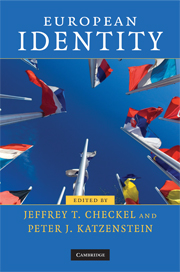Preface
Published online by Cambridge University Press: 05 June 2012
Summary
When John Haslam, social sciences editor at Cambridge University Press, and Andreas Føllesdal, consulting editor for this series, first approached us to write a book on European identity, our response was along the lines of “been there, done that, why bother to do it again?” Yet, as we thought about the possibility, we began to warm to the idea. We relished the prospect of collaboration. Furthermore, existing scholarship seemed compartmentalized and missed one central feature of identity in the new Europe. European Union (EU) specialists, typically political scientists and often funded by the EU Commission, focussed overwhelmingly on the Union and the effects its institutions had in crafting senses of allegiance from the “top down,” as it were. At the same time and from a variety of disciplinary perspectives, students of immigration, nationalism, and religion explored how feelings of community in Europe arose from the “bottom up,” outside of or around EU institutions. Moreover, almost everyone was taken by surprise at how the return of Eastern Europe was profoundly and irrevocably changing European identity politics.
This book makes a start at addressing these omissions and oversights. We do not favor either top-down or bottom-up storylines. Instead, we explore the intersections and interactions between the two, and do so through the lens of multiple disciplinary perspectives. This approach allows us to capture the reality of identity in today's quasi-constitutionalized, enlarged, and deeply politicized Europe, where senses of “who we are” are fracturing and multiplying at one and the same time.
- Type
- Chapter
- Information
- European Identity , pp. xi - xivPublisher: Cambridge University PressPrint publication year: 2009
- 1
- Cited by



